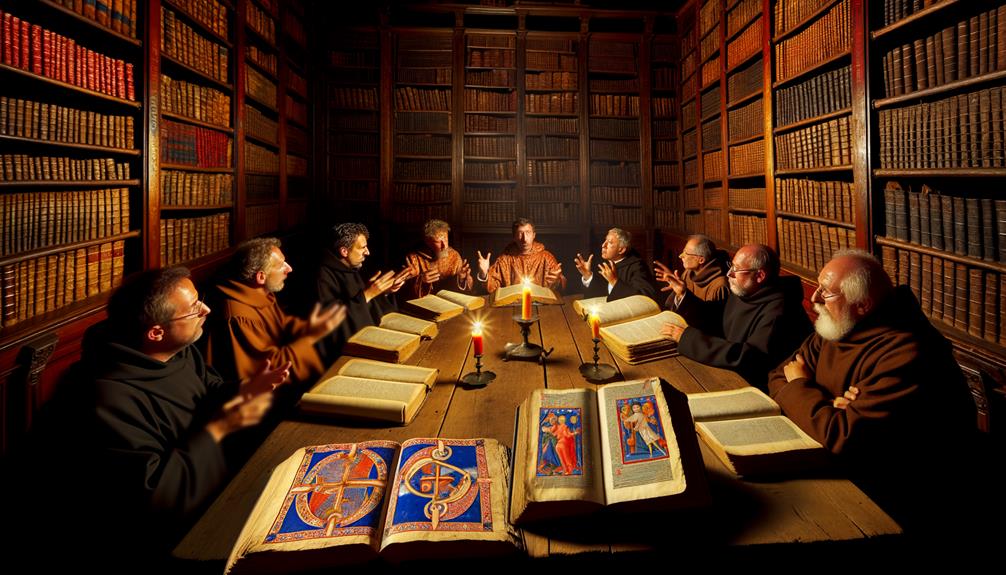Kingdom of God Meaning in Bible: Authority and Salvation
The Kingdom of God is a central concept in biblical teaching, representing God’s rule and divine sovereignty over creation. Rooted in the Hebrew Scriptures and extensively developed in the New Covenant, it is characterized by justice, peace, and the transformative power of God’s presence.
Jesus’ parables and miracles illustrate both its present reality and future fulfillment, symbolizing ethical conduct and spiritual growth. Prophetic promises and covenants in the Old Covenant foreshadow this divine reign, while apostolic writings emphasize its ethical and spiritual dimensions.
By exploring further, one can uncover the multi-faceted aspects of God’s Kingdom within the biblical narrative.

Kingdom of God Meaning in the Bible: Understanding God’s Sovereignty, Presence, and Eternal Reign
| Aspect | Biblical Meaning |
|---|---|
| Reign of God’s Sovereignty | The Kingdom of God refers to God’s sovereign rule over all creation. It emphasizes God’s authority and His divine plan unfolding on Earth and in heaven (Psalm 103:19, Daniel 4:34-35). |
| Spiritual Realm & Presence | The Kingdom is not just a physical place but a spiritual reality where God’s presence, will, and authority are acknowledged and followed. It is a realm where God reigns supreme in the hearts of believers (Luke 17:21). |
| Manifestation Through Jesus Christ | Jesus’ ministry marked the arrival of the Kingdom of God on Earth. Through His teachings, miracles, death, and resurrection, He revealed and inaugurated God’s Kingdom, offering salvation and eternal life (Matthew 4:17, Mark 1:15). |
| Eternal & Present Reality | The Kingdom of God is both a present and future reality. It is here now, growing within the lives of believers, but it will be fully realized in the future when God’s complete reign is established (Matthew 6:10, Revelation 21:1-3). |
| Invitation to Righteousness, Peace & Joy | Entering the Kingdom means living according to God’s righteousness, experiencing His peace, and sharing in His joy. It invites believers to transform their lives by aligning with God’s will and sharing His love with others (Romans 14:17, Matthew 6:33). |
Biblical Origins

Rooted deeply in the teachings of Jesus Christ, the concept of the Kingdom of God finds its origins in the Hebrew Scriptures, where it is envisioned as a divine domain characterized by justice, peace, and the sovereign rule of God.
This theological construct is central to the New covenant narrative, where Christ’s parables and proclamations consistently emphasize its imminence and transformative power.
By analyzing scriptural texts, one finds that the Kingdom is not merely a future promise but an active, dynamic reality breaking into the present world.
Jesus’ ministry, as recorded in the Gospels, underscores the immediacy of God’s reign, inviting individuals to experience a reoriented life aligned with divine principles.
This dual aspect of ‘already’ and ‘not yet’ invites profound theological reflection.
Old Testament Perspectives

In the Old Scriptures, the concept of the Kingdom of God is rooted in the covenantal relationship established between God and Israel, wherein Israel was to be a holy nation under divine rule.
Prophetic literature further elucidates this kingdom by forecasting a future reign characterized by justice and peace, as envisioned in texts like Isaiah and Daniel.
Additionally, the theme of divine kingship is pervasive, underscoring God’s sovereign authority and ultimate governance over all creation.
Covenant With Israel
The concept of the Kingdom of God in the Old Scripture is deeply intertwined with the covenantal relationship established between God and Israel, reflecting a divine promise and a call to communal holiness.
Foundational to this covenant is God’s promise to Abraham (Genesis 12:1-3), later reaffirmed through Moses at Sinai (Exodus 19:5-6). Here, Israel is designated as a ‘kingdom of priests and a holy nation,’ tasked with embodying God’s justice and righteousness.
The Davidic Covenant (2 Samuel 7:12-16) further solidifies this relationship, promising an enduring dynasty and a throne established forever.
These covenants collectively underscore a theological framework where God’s reign is manifested through a chosen people, committed to His statutes and embodying His divine will.
Prophetic Kingdom Promises
Building upon the covenantal foundation, the prophetic literature of the Old Scriptures envisions the Kingdom of God as a future hope characterized by divine justice, universal peace, and the restoration of Israel. This vision is articulated through various prophetic promises:
- Divine Justice: Prophets like Isaiah and Jeremiah foretell a time when God will establish a reign of righteousness, judging nations and individuals (Isaiah 9:7; Jeremiah 23:5).
- Universal Peace: Significantly, in Isaiah 2:4, the imagery of swords being turned into plowshares symbolizes a cessation of war and the establishment of enduring peace.
- Restoration of Israel: Ezekiel 37:21-28 speaks of the reunification and spiritual renewal of Israel under one shepherd, highlighting God’s faithfulness to His covenant people.
These prophetic promises underscore the eschatological hope central to the Old Scripture narrative.
Divine Kingship Themes
Central to the Old Scriptures’ portrayal of divine kingship is the affirmation of Yahweh’s ultimate sovereignty over creation and human history. This foundational theme is illustrated through various passages, such as Psalm 47:2, which proclaims, ‘For the LORD Most High is awesome, the great King over all the earth.’
The Old Canon consistently depicts Yahweh as enthroned above the cherubim (e.g., Isaiah 37:16) and as the judge and ruler of nations (e.g., Psalm 96:10).
In addition, the covenantal promises to Israel, particularly through Davidic kingship (2 Samuel 7:12-16), underscore the divine right and authority granted by Yahweh.
These texts collectively emphasize Yahweh’s unparalleled dominion and theocratic governance, shaping Israel’s understanding of divine kingship.
New Testament Revelations

The New Covenant offers a more nuanced understanding of the Kingdom of God, primarily through the teachings of Jesus Christ and the expositions of His apostles.
Jesus’ parables and sermons frequently reference the Kingdom, emphasizing its spiritual nature and imminent realization.
Apostolic writings, particularly those of Paul and John, further elucidate this concept, interpreting it as both a present reality and a future hope.
Jesus’ Teachings Explored
Examining Jesus’ teachings, particularly those found in the New Scripture, reveals profound insights into the concept of the Kingdom of God. His parables and sermons encapsulate the essence of this divine domain.
Parables: Through stories like the Parable of the Mustard Seed (Matthew 13:31-32), Jesus illustrates the Kingdom’s growth from small beginnings to a vast, encompassing reality.
Sermon on the Mount: In Matthew 5-7, Jesus outlines the ethical and spiritual principles that define the Kingdom, emphasizing humility, mercy, and purity of heart.
Miracles: Acts of healing and exorcism (Luke 11:20) serve as tangible manifestations of the Kingdom, demonstrating God’s power and mercy breaking into the human experience.
These elements collectively shape a nuanced understanding of the Kingdom of God.
Apostolic Interpretations Explained
Many apostolic writings in the New scriptures provide a rich tapestry of interpretations that further elucidate the multifaceted nature of the Kingdom of God. The apostles, through their epistles and teachings, explore various dimensions of this divine kingdom, emphasizing its spiritual, ethical, and eschatological aspects. They often contrast earthly kingdoms with the heavenly domain, underscoring themes of righteousness, peace, and divine justice. They also delve into the practical implications of living as citizens of the Kingdom of God, offering guidance on how to embody its values in everyday life. Through bible verse analysis, they unpack the deeper meanings of Jesus’ parables and teachings, revealing the transformative power of the Kingdom and the profound impact it has on the lives of believers. Additionally, the apostles emphasize the urgency of aligning one’s life with the Kingdom of God, as they saw it as the central message of Christ’s ministry and the ultimate fulfillment of God’s redemptive plan for humanity.
| Apostle | Interpretation Focus |
|---|---|
| Paul | Spiritual transformation |
| Peter | Ethical living and holiness |
| John | Divine love and eternal life |
| James | Faith manifested through deeds |
These interpretations collectively offer a thorough understanding of the Kingdom of God, aligning with Jesus’ teachings while expanding on their implications for believers’ lives.
Jesus’ Teachings

Central to Jesus’ teachings, the concept of the Kingdom of God encompasses both a present reality and a future fulfillment, reflecting a transformative reign of divine justice and peace.
Jesus articulated this dual nature through various aspects:
- Immediacy: Jesus proclaimed that the Kingdom of God is at hand (Mark 1:15), urging immediate repentance and faith.
- Ethical Transformation: He emphasized a radical reorientation of life, advocating love for enemies (Matthew 5:44) and care for the marginalized (Matthew 25:35-40).
- Eschatological Hope: Jesus foretold a future culmination when God’s will would be fully realized on earth as it is in heaven (Matthew 6:10), portraying a consummate divine rule.
Thus, Jesus’ teachings present the Kingdom of God as both a present call to action and a future promise.
Parables of the Kingdom

The parables of the Kingdom, as narrated by Jesus, serve as profound vehicles for conveying spiritual truths.
These parables not only open avenues for varied interpretations but also encapsulate essential lessons that elucidate the nature and values of the Kingdom of God.
In addition, examining their modern relevance provides insights into how these timeless teachings continue to influence contemporary Christian thought and practice.
Interpretations of Parables
Numerous parables in the Bible encapsulate the essence of the Kingdom of God, offering profound insights into its nature and principles. These parables serve as didactic tools that reveal the multifaceted dimensions of the Kingdom. Scholars often interpret these parables in the following ways:
- Mystical Revelation: Parables like the Mustard Seed (Matthew 13:31-32) illustrate the Kingdom’s growth from inconspicuous beginnings to expansive influence.
- Ethical Paradigm: The Good Samaritan (Luke 10:25-37) emphasizes the Kingdom’s call for radical, inclusive love and compassion.
- Eschatological Promise: The Parable of the Ten Virgins (Matthew 25:1-13) underscores preparedness and vigilance for the Kingdom’s ultimate fulfillment.
These interpretations enrich our understanding, providing both a divine mystery and a practical guide for living within the Kingdom of God.
Lessons From Parables
Examining the parables in the context of the Kingdom of God reveals essential lessons that shape our theological understanding and ethical conduct. The parables of Jesus, such as the Parable of the Sower and the Parable of the Mustard Seed, provide profound insights into the nature, growth, and values of the Kingdom. They underscore themes such as divine grace, human responsibility, and the transformative power of the Gospel. The following table illustrates key parables and their core lessons:
| Parable | Core Lesson |
|---|---|
| The Sower | Receptivity to God’s Word |
| The Mustard Seed | Growth from small beginnings |
| The Leaven | Transformative influence of the Kingdom |
| The Hidden Treasure | Value of the Kingdom |
| The Net | Final judgment and separation |
These teachings collectively illuminate the Kingdom’s profound spiritual dynamics.
Parables’ Modern Relevance
Modern interpretations of the Kingdom parables reveal their enduring significance in addressing contemporary spiritual and ethical challenges. These parables, found in the Gospels, continue to offer profound lessons that resonate with modern audiences. Their relevance can be understood through several dimensions:
- Spiritual Growth: Parables like the Mustard Seed encourage believers to value small acts of faith, illustrating how they can grow into something substantial over time (Matthew 13:31-32).
- Social Justice: The Good Samaritan underscores the importance of compassion and aid to all, transcending social boundaries (Luke 10:25-37).
- Ethical Leadership: The Parable of the Talents calls for responsible stewardship and the ethical use of resources, relevant in today’s economic and organizational contexts (Matthew 25:14-30).
These timeless teachings continue to impart wisdom applicable to modern life.
Apostolic Interpretations

The Apostolic interpretations of the Kingdom of God often emphasize the fulfillment of Old Testament scriptures and prophecies through the life and teachings of Jesus Christ. Apostles, including Paul and Peter, elucidate that the Kingdom is both a present reality and a future hope, initiated by Christ’s resurrection and anticipated in His return (1 Corinthians 15:20-28, 2 Peter 3:13).
They argue that Jesus’ ministry inaugurates a new covenant, fulfilling prophecies such as those in Isaiah and Daniel, and establishes a transformative relationship between God and humanity (Hebrews 8:6-13).
Apostolic writings stress ethical implications for believers, urging them to embody Kingdom values such as righteousness, peace, and joy in the Holy Spirit (Romans 14:17).
Consequently, the Kingdom is both eschatological and existential.
Prophetic Visions

Prophetic visions throughout the Bible provide profound insights into the nature and ultimate realization of the Kingdom of God, often revealing divine promises and future events that shape theological understanding.
These visions, conveyed through the words of prophets, offer glimpses of God’s sovereign rule and eschatological fulfillment.
Key prophetic visions include:
- Isaiah’s Vision: Isaiah 11:6-9 portrays a harmonious creation where ‘the wolf shall dwell with the lamb,’ symbolizing peace and divine order.
- Daniel’s Vision: Daniel 7:13-14 depicts ‘one like a son of man’ given everlasting dominion, highlighting the Messiah’s eternal reign.
- John’s Revelation: Revelation 21:1-4 envisions a new heaven and earth where God dwells with His people, eradicating sorrow and death.
These visions collectively illuminate the transformative and redemptive aspects of God’s Kingdom.
Theological Debates

While prophetic visions provide a glimpse into the Kingdom of God, theological debates often arise regarding their interpretation and the practical implications for contemporary Christian faith and practice. Scholars examine scriptural texts, historical contexts, and doctrinal perspectives to navigate these complex issues. Central to these debates are questions of eschatology, soteriology, and ecclesiology.
| Perspective | Key Question | Scriptural Basis |
|---|---|---|
| Premillennialism | When will Christ return to establish His Kingdom? | Revelation 20:1-6 |
| Amillennialism | Is the Kingdom of God a present spiritual reality? | Luke 17:20-21 |
| Postmillennialism | Will the world progressively improve before Christ’s return? | Matthew 13:31-33 |
| Dispensationalism | How do different covenants affect God’s Kingdom plan? | Ephesians 3:2-6 |
| Liberation Theology | Does the Kingdom mandate social justice? | Luke 4:18-19 |
These theological frameworks greatly shape Christian worldview and praxis.
Personal Faith Impacts

Understanding the Kingdom of God profoundly influences an individual’s personal faith, shaping their spiritual priorities and ethical commitments. This theological concept encourages believers to align their lives with divine principles, fostering a deeper sense of purpose and moral integrity. The impact manifests in several key areas:
- Spiritual Priorities: Recognizing the Kingdom of God prompts individuals to prioritize spiritual growth and seek a closer relationship with God, as outlined in Matthew 6:33.
- Ethical Behavior: Believers are motivated to reflect Christ-like virtues, such as love, justice, and mercy, in their daily interactions, echoing the teachings of the Sermon on the Mount.
- Hope and Assurance: The promise of God’s Kingdom provides hope and assurance, reinforcing faith amidst life’s trials, as highlighted in Romans 8:18.
Communal Worship Implications

The concept of the Kingdom of God not only transforms individual faith but also profoundly shapes communal worship practices, creating a collective environment where believers can experience and manifest divine principles together.
Scripturally, communal worship is depicted as a foretaste of the eschatological gathering in God’s Kingdom (Revelation 7:9-10).
In the New Covenant, Acts 2:42-47 illustrates the early Christian community‘s devotion to teaching, fellowship, breaking of bread, and prayer, reflecting Kingdom values of unity, love, and shared purpose.
This communal worship fosters a sense of belonging and mutual edification, embodying the Kingdom’s ethos.
Consequently, worship becomes a transformative act that not only glorifies God but also strengthens the communal bond among believers, aligning them with the Kingdom’s vision.
Modern-Day Relevance

In contemporary society, the concept of the Kingdom of God continues to hold significant theological and practical implications for believers, influencing their spiritual lives and communal practices. This enduring relevance can be examined through several key aspects:
- Spiritual Transformation: The Kingdom of God calls for personal repentance and spiritual renewal, aligning one’s life with Christ’s teachings (Matthew 6:33).
- Social Justice: Believers are encouraged to pursue justice and mercy, reflecting the Kingdom’s values in addressing modern social issues (Micah 6:8).
- Communal Unity: The Kingdom promotes unity within the Christian community, fostering a spirit of love and cooperation among diverse groups (Ephesians 4:3).
These elements underscore the Kingdom’s profound impact on contemporary Christian living.
Conclusion
The Kingdom of God, rooted in biblical origins, illuminated through Old Testament perspectives, and revealed in New Testament teachings, encapsulates Jesus’ profound messages and parables.
Engendering theological debates, influencing personal faith, shaping communal worship, and maintaining modern-day relevance, the Kingdom’s multifaceted interpretations continue to inspire and challenge believers.
As scripture unfolds its divine narrative, the Kingdom of God stands as a witness to an enduring, transformative, and redemptive divine promise, resonating through time and eternity.






